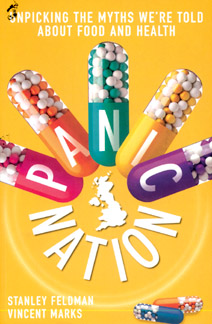|
dailynews |
|
|
|
|
|
OTHER LINKS |

|

|

|
Panic Nation - Chapter Seven: Junk Food - part IIContinued from 07.07.06
A diet consisting only of Aberdeen Angus streak would be as 'junky' as one composed only of hamburgers. Similarly, animal fat is broken down and absorbed in the same way whether it originated in a hamburger, a lamb chop or the cheese on top of a pasta dish. We need some fat in our diet, not only because it contains essential fat-soluble vitamins but also because it contributes much of the taste to foods. Very lean meat is tasteless unless enriched by a sauce containing fatty flavouring. No one would suggest that eating hamburgers and chips every day would constitute a good diet, but it would be better than one made up of Waldorf salad. The answer lies in a diet that is both varied and balanced. We have been so indoctrinated about the evils of junk food, a concept so closely tied up with hamburgers that, if you were to ask the man in the street which was the better meal, pate de foie gras or a hamburger, he would almost certainly condemn the hamburger. In terms of its contribution to the food requirements of the body, the pate, with its high cholesterol and fat and low-value protein, approaches the junk-food profile while a hamburger with tomato ketchup has good mixed-food value. A tomato, basil and chicken salad from Safeway is presented as 'healthy food' although it contains roughly the same amount of fat and calories as a Big Mac and chips (Sunday Times, August 2004). If, instead of eating a Big Mac, people were suddenly to start eating these salads, it is likely they would be any healthy or lose any weight. There is no doubt that snobbery and cost contributes to the perception of what is called 'junk'. The term is associated with foods originating in the fast-food chains of America rather than those coming from 'foody' France, home of the croque monsieur and foie gras, from Belgium, the country of moules et frites, or from Italy with its creamy pastas covered with cheese. For a century, generations of Britons ate fried fish and chips, liberally dosed with salt and vinegar, without becoming dangerously overweight. However, when the fish protein is replaced by the meat of a hamburger or by Kentucky Fried Chicken, it suddenly becomes a National disaster. The present obsession with obesity has resulted in any food providing a high calorie content being labelled as 'junk'. It is obvious nonsense: Cheese is good food, as are fish and chips and hamburgers. It is not the particular food that makes people fat, it is the amount of it that they eat. The whale is hugely fat - it is covered in fatty blubber - but it eats only plankton (which would no doubt qualify for the five-a-day portions of vegetables and fruit we are told we must eat). It is fat because it eats lots of plankton, not because plankton contains many calories. A person gorging themselves on fruit would become fat more quickly than one eating the occasional hamburger. There is often confusion between so-called junk food and fast food. A pizza can provide an excellent meal even if it is likely to be a little heavy on fats, whereas a cherry tart that took hours to make is likely to contain more carbohydrate - even before the cream has been added to increase its fat content. Neither is junk, and both contribute food essential for the nourishment of the body. So what is junk? I suppose the nearest one comes to a substance that is not nourishing is water. Nevertheless, a fluid intake of about two litres a day (some of it as water) is essential for survival. Fibre contributes so little towards our essential nutritional requirements that it could be considered a 'junk food', but of course it has a part to play in digestion. The lettuce and cucumber salad we are told we must eat every day to prevent us dying prematurely is made up of over 98 per cent water, while most of the rest is fibre and contributes little of nutritional value. We all know of children who have refused any salad or green vegetables and have grown up to be long-lived, healthy adults. Lettuce and cucumber would qualify for junk-food status but for the small amounts of water-soluble vitamins and antioxidants that they contain. Celery is said to require more energy in the eating than one gains from its consumption - that might qualify it for the label 'junk', but there is no evidence to suggest that it is in any way harmful. |
 These broken-down products of protein are absorbed into the
bloodstream to be restructured into body proteins in the various cells
of the body. Any excess ends up as fat. One source of animal protein is
not necessarily of better value to the body than another, nor is it more
or less fattening.
These broken-down products of protein are absorbed into the
bloodstream to be restructured into body proteins in the various cells
of the body. Any excess ends up as fat. One source of animal protein is
not necessarily of better value to the body than another, nor is it more
or less fattening. 






